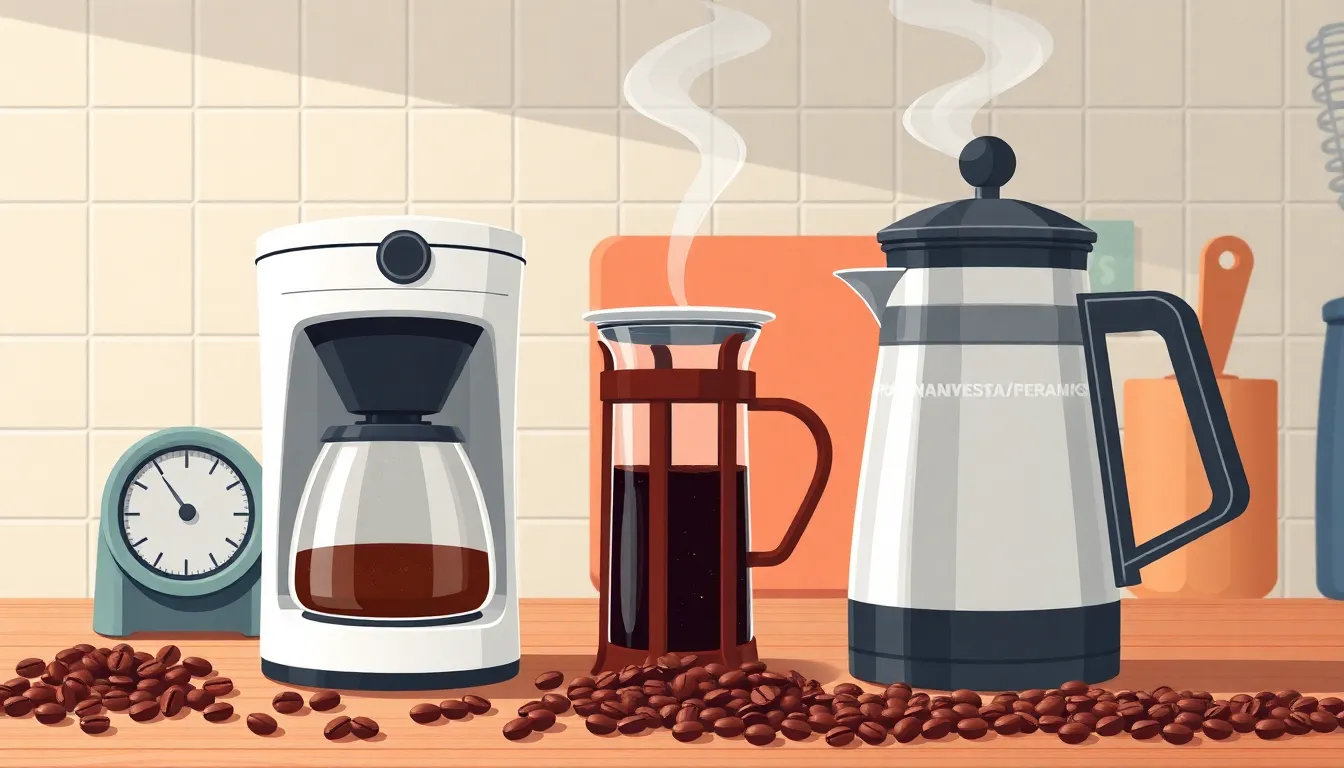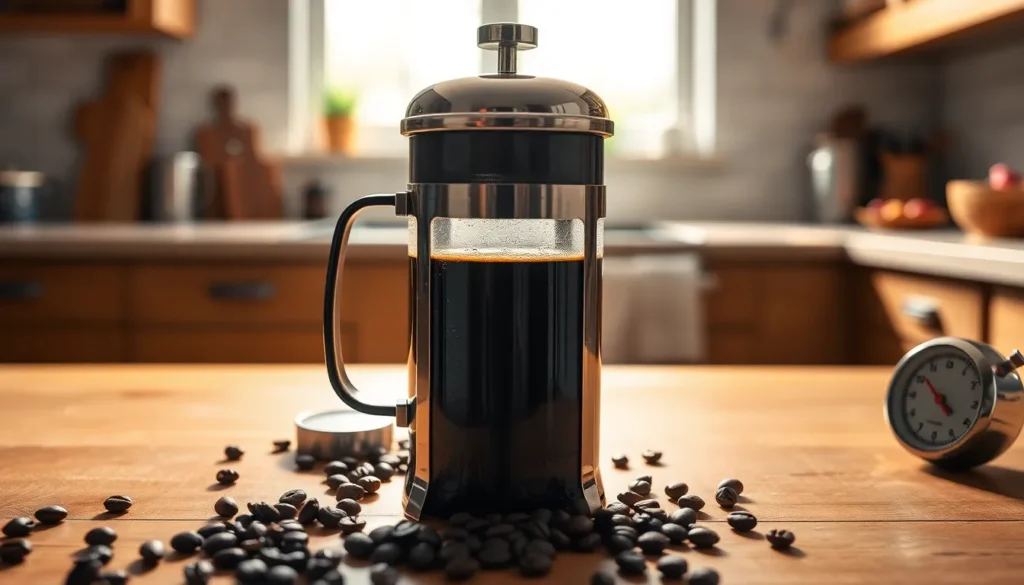Table of Contents
ToggleBrewing the perfect cup of coffee can feel like an art form, especially when it comes to using a French press. But here’s the kicker: timing is everything. Let it sit too long and you’ve got a bitter brew that could wake the dead. Let it sit too short and you’re left with a watery disappointment that wouldn’t satisfy even the grumpiest morning person. So how long should you really let that aromatic concoction steep?
In this article, we’ll break down the ideal steeping time for your French press, ensuring you achieve that perfect balance of flavor and aroma. Whether you’re a coffee novice or a seasoned enthusiast, knowing the sweet spot for steeping will elevate your coffee game. Get ready to impress your taste buds and maybe even your friends—because who doesn’t want to be known as the French press guru?
Understanding French Press Brewing
Mastering French press brewing enhances coffee flavor through precise techniques. Knowledge about the French press aids in achieving the perfect cup.
What Is a French Press?
A French press, also known as a press pot, brews coffee by steeping coarse coffee grounds in hot water. This method involves using a plunger to separate the grounds from the brewed coffee once steeping completes. Popular among coffee enthusiasts, the French press allows oils and fine particles to remain in the brew, contributing to a rich texture and full-bodied flavor. It stands out from other brewing methods by providing direct contact between water and coffee grounds, promoting a more intense flavor profile.
Benefits of Using a French Press
Using a French press offers several advantages that enhance the coffee experience. It highlights the coffee’s natural oils, resulting in a richer taste compared to drip methods. Many coffee aficionados appreciate how the French press allows for complete control over brewing variables, such as steeping time and water temperature. This flexibility supports experimentation with different coffee beans and methods, fostering a deeper understanding of coffee flavors. Additionally, the French press requires minimal equipment and is environmentally friendly, as it doesn’t rely on paper filters or electricity.
The Brewing Process

Understanding the brewing process is crucial for perfecting French press coffee. Several factors, including coffee grounds and water ratio, as well as water temperature, directly influence the final flavor.
Coffee Grounds and Water Ratio
A standard coffee-to-water ratio is vital for achieving a balanced brew in a French press. A commonly recommended ratio is 1:15, which means one part coffee to 15 parts water. For instance, using 30 grams of coffee requires 450 milliliters of water. Adjustments may be necessary based on personal taste preferences. Coarse ground coffee allows optimal extraction during steeping, while fine particles can cause over-extraction and bitterness. When measuring, consistency ensures a reliable and enjoyable cup each time.
Water Temperature
Proper water temperature significantly affects the brewing outcome. Ideal temperatures range from 195 to 205 degrees Fahrenheit, just below boiling. Using water that’s too hot can scorch the coffee grounds, leading to undesirable flavors. Conversely, cooler water may result in insufficient extraction, leaving the brew weak. Pouring hot water evenly over the grounds helps ensure even saturation. Allowing water to rest for about 30 seconds after boiling brings it to the optimal brewing range.
How Long to Let French Press Sit
The steeping time for a French press directly impacts the coffee’s flavor. Achieving the right balance enhances the overall experience.
Recommended Brewing Times
A steeping time of four minutes is often ideal for most coffee types. Some coffee enthusiasts prefer three minutes for a lighter brew. Others may opt for five minutes if they desire a stronger flavor. Experimenting within this range helps find the perfect brewing time for individual taste preferences. Following these guidelines brings out the richness of the coffee while minimizing bitterness.
Factors That Influence Brewing Time
Several factors affect brewing time when using a French press. Coffee grind size significantly influences extraction; coarser grinds typically require longer steeping. Water temperature also plays a crucial role; higher temperatures expedite extraction, while cooler ones slow it down. Coffee-to-water ratio impacts strength; a stronger ratio calls for shorter brewing times. Additionally, personal preference determines whether to adjust steeping duration for a customized flavor. Understanding these variables enables mastery of French press brewing.
Common Mistakes to Avoid
Brewing coffee with a French press involves timing and technique, and avoiding certain mistakes enhances the experience.
Over-Steeping
Over-steeping becomes a common issue for many. Leaving coffee in contact with grounds longer than the recommended four minutes can lead to bitterness. Compounds extracted during prolonged steeping negatively affect flavor. Consequently, the coffee turns harsh and unpleasant, detracting from its inherent richness. Sticking to the ideal steeping time is crucial for balance. Many aficionados suggest tasting the brew to determine personal preference. Adjustments can be made for future brews based on that feedback.
Under-Steeping
Under-steeping also presents challenges. Many individuals underestimate steeping time, resulting in a weak and watery cup. Ideally, a four-minute brew delivers optimal extraction. Lack of sufficient time prevents the extraction of essential flavors and aromas. If the coffee tastes flat, increasing steeping time can improve the final outcome. Experimentation with variables, such as grind size and preferred steeping length, leads to a custom experience. Understanding the delicate balance between steeping times ensures a satisfying brew.
Perfecting the French press brewing technique hinges on understanding steeping times and their impact on flavor. By adhering to the recommended four-minute steeping time, coffee enthusiasts can unlock a rich and aromatic cup while avoiding the pitfalls of bitterness or weakness. Experimenting with slight variations in steeping duration allows for a more personalized experience, catering to individual taste preferences.
With practice and attention to detail, anyone can master the French press and elevate their coffee-making skills. Embracing this brewing method not only enhances flavor but also fosters a deeper appreciation for the coffee itself. Enjoying the process will lead to consistently satisfying results and the enjoyment of a perfectly brewed cup.





